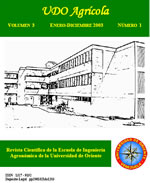
|
Revista Científica UDO Agrícola
Universidad de Oriente Press
ISSN: 1317-9152
Vol. 13, No. 1, 2013, pp. 17-24
|
 Bioline Code: cg13002
Bioline Code: cg13002
Full paper language: English
Document type: Research Article
Document available free of charge
|
|
|
Revista Científica UDO Agrícola, Vol. 13, No. 1, 2013, pp. 17-24
| en |
Performance and some physiological traits of Iranian corn ( Zea mays  L.) varieties as impelled by drought stress L.) varieties as impelled by drought stress
REZAEIEH, Kiarash Afsharpour & EIVAZI, Alireza
Abstract
Plants are exposed to various environmental stresses. One of these factors is the amount of accessible water, which restricts
the crop production. To study the effect of water deficit on physiological traits of five corn varieties (SC108, SC500,
SC647, SC700 and SC704) at both vegetative and reproductive stages, two separate field experiments were carried out
based on a randomized complete blocks design with five replications. Furthermore, by using poly ethylene glycol (PEG)
6000, the influence of dehydration on both normal and stressed seeds of field experiment was assessed in glasshouse.
Results revealed that grain yield (-48%), relative water content (-26%), leaf chlorophyll (-32%) decreased and electrical
conductivity (+98%), potassium (+104%), carbohydrates (+47%) contents increased under drought. Maximum and
minimum grain yield were obtained in SC704 and SC108, respectively. In glasshouse experiments, radicle and plumule
length and dry weight declined when comparing to non-stress conditions. SC704 and SC500 were identified as the most
tolerant varieties at both field and glasshouse experiments, respectively. None of the stressed seeds of the field experiment
germinated using PEG 6000.
Keywords
Corn varieties; drought stress; polyethylene glycol
|
| |
| es |
Comportamiento y algunos caracteres de variedades iraníes de maíz ( Zea mays  L.) afectadas por el estrés hídrico L.) afectadas por el estrés hídrico
REZAEIEH, Kiarash Afsharpour & EIVAZI, Alireza
Resumen
Las plantas están expuestas a varios estreses ambientales. Uno de estos factores es la cantidad de agua accesible, lo que
limita la producción de cultivos. Para estudiar el efecto del déficit hídrico sobre los caracteres fisiológicos de cinco
variedades de maíz (SC108, SC500, SC647, SC700 y SC704) en las etapas vegetativas y reproductivas, se realizaron dos
experimentos de campo independientes en un diseño de bloques completos al azar con cinco repeticiones. Además,
mediante el uso de poly ethylene glycol (PEG) 6000, se evaluó en el invernadero, la influencia de la deshidratación de
semillas normales y bajo estrés provenientes del experimento de campo. Los resultados revelaron que el rendimiento de
granos (-48%), contenido relativo de agua (-26%) y la clorofila en las hojas (-32%) disminuyeron y la conductividad
eléctrica (+98%), potasio (+104%) y contenido de carbohidratos (+47%) aumentaron bajo la sequedad. El rendimiento
máximo y mínimo del grano fue obtenido para las variedades SC704 y SC108, respectivamente. En los experimentos de
invernadero, la longitud y peso seco de las raíces y de la plúmula se redujeron en comparación con la condición sin estrés.
SC704 y SC500 se identificaron como las variedades más tolerantes en experimentos de campo y de invernadero,
respectivamente. Ninguna de las semillas bajo estrés del experimento de campo germinó utilizando PEG 6000.
Palabras-clave
Variedades de maíz; estrés hídrico; polietilenglicol
|
| |
© Copyright 2013 - Revista Científica UDO Agrícola
Alternative site location: http://www.udoagricola.orgfree.com
|
|
